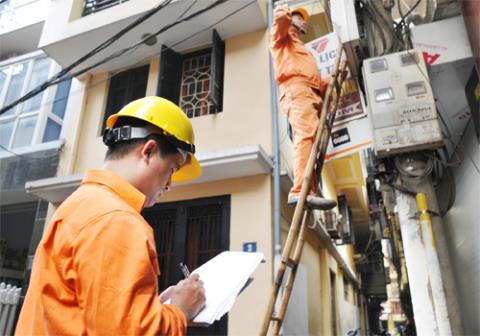Exchange rate fluctuations may push up power prices
 |
EVN incurred a loss of VND9.8 trillion ($440 million) from exchange rate volatility in 2015. This loss has not yet been accounted into production costs.
Dinh Quang Tri, deputy general director of EVN, said because the global price of oil and gas has decreased, the company was able to make up for VND5 trillion ($224.2 million) of this loss. Also, EVN optimised its production, saving another VND3.5 trillion ($157 million). Therefore, the company’s losses from exchange rate fluctuations amount to about VND1.3 trillion ($58 million).
The company does not have the finances to satisfy its capital demand to invest and domestic banks do not have enough money either, so the company has to borrow from official development aid (ODA) and from foreign financial institutions.
Moreover, according to Nguyen Anh Tuan, director of Electricity Regulatory Authority of Vietnam, there are power plants in Vietnam built in the build-operate-transfer format where EVN has to buy the power they produce using either USD or VND calculated at the exchange rate on the day of transaction. It also has to buy power from China.
“The three main currencies affecting EVN’s ability to pay its debts are the USD, the Japanese Yen, and the Chinese Yuan. In 2015, the average USD/VND rate was VND21,948 per USD, up VND726 compared to 2014’s average rate, an increase of 3.42 per cent,” said Tuan.
Regarding whether the exchange rate is going to affect the price of power in 2017, Tuan said that the retail power price will be calculated based on the cost of production, which itself is based on fuel expenses, the price at which it buys power from the plants, the sources of power, and the exchange rate, as well as 2015 production costs. “If the 2017 cost of production is 7 per cent higher than it was in 2015, only then can EVN adjust the retail price.”
Dinh Quang Tri said each year EVN needs between $5 billion and $6 billion to invest in its projects. “Given its current financial situation, EVN needss the government to guarantee its loans,” he said. “EVN is striving to make sure all member companies can issue their own bonds without needing government guarantee.”
What the stars mean:
★ Poor ★ ★ Promising ★★★ Good ★★★★ Very good ★★★★★ Exceptional
Latest News
More News
- Vietnamese businesses diversify amid global trade shifts (February 03, 2026 | 17:18)
- Consumer finance sector posts sharp profit growth (February 03, 2026 | 13:05)
- Vietnam and US to launch sixth trade negotiation round (January 30, 2026 | 15:19)
- NAB Innovation Centre underscores Vietnam’s appeal for tech investment (January 30, 2026 | 11:16)
- Vietnam moves towards market-based fuel management with E10 rollout (January 30, 2026 | 11:10)
- Vietnam startup funding enters a period of capital reset (January 30, 2026 | 11:06)
- Vietnam strengthens public debt management with World Bank and IMF (January 30, 2026 | 11:00)
- PM inspects APEC 2027 project progress in An Giang province (January 29, 2026 | 09:00)
- Vietnam among the world’s top 15 trading nations (January 28, 2026 | 17:12)
- Vietnam accelerates preparations for arbitration centre linked to new financial hub (January 28, 2026 | 17:09)
















 Mobile Version
Mobile Version